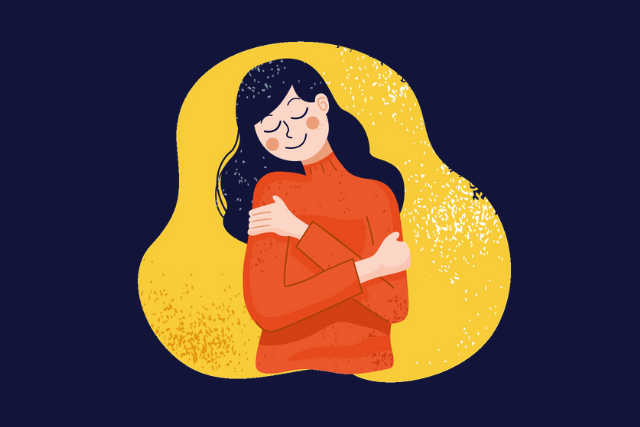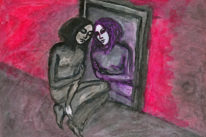
“Be nice to yourself. It’s hard to be happy when someone is mean to you all the time.” ~Christine Arylo
When the alarm went off, the haze of a dream dissolved into the memory of yesterday’s failure. My stomach was still full from last night’s binge, and I was utterly disgusted with myself.
How could I have blown it again? What was wrong with me?
I grabbed a notepad and pen and resolved that today would be different. Today I would stick to my diet!
As I had every day for the previous several weeks, I made a list of every single thing I would allow myself to put into my mouth that day, and its exact calorie count.
The fact that this totaled up to starvation rations was, to my adolescent mind, perfectly sensible. I had to starve myself.
Until I reached the (utterly arbitrary) “optimal” number on the scale, I would never be acceptable. Lovable. Enough.
Or so I thought. The fact that my body was already a healthy weight had nothing to do with it.
But this day, like all the days before, did not go as planned.
By the first break period, hunger veered me from my rigid diet and I bought a cup of raisins and peanuts—a “forbidden” snack that took me well over my daily calorie allowance. Then, furious at myself for blowing it, I sought comfort by gorging myself on the very thing I was impossibly trying to avoid: food.
Day after day it was the same vicious cycle: impose crazy-strict limits, fail to follow them, beat myself up, numb out by binge eating, beat myself up even more.
Then, in disgust and desperation, I’d lock myself in the bathroom and secretly throw up.
All of which, of course, only made me feel worse about myself, so I’d impose even stricter limits, which were, of course, even more impossible to stick to.
This pattern of shame cycled on and off for close to a decade.
Sometimes it was worse, sometimes better. I had periods when my eating was relatively normal, but for a long time I believed that, like a recovering alcoholic, I’d never be entirely free from the danger of backsliding. “Once a bulimic, always a bulimic,” I often said.
Over my years of healing, though, I was pleased to discover that I was wrong.
It didn’t happen overnight, but I’m living proof that it is possible to break free from binge eating behavior.
I could tell you all the things that helped me in my journey toward health. For example:
- The attention of my first boyfriend, who made me feel attractive and loved.
- Giving away all my “skinny” clothes and buying a new wardrobe of clothes that actually fit and made me feel attractive.
- Studying Feminist theory and learning how my self-concept was programmed and poisoned by a sexist status quo and powerful Capitalist institutions, which greatly benefit when women focus our energies on changing our bodies, rather than changing the world.
- Being forced by an injury to stop pursuing a dance career, which meant no more standing in front of a mirror in a leotard for hours every day.
- Experiencing my boyfriend’s family’s attitude of abundance around food, which made me realize that my own family had an attitude of scarcity that exacerbated my dysfunctional eating. (Better eat those brownies now, because there won’t be any more when these are gone!)
- Eliminating all restrictions and rules around which foods were “allowed” and which “forbidden,” and in what portion sizes. (Restrictions don’t work, because it’s human nature to always crave what’s forbidden!)
When I looked back from decades later, a pattern emerged. Underlying all of these influences was the simple concept of self-compassion.
Acknowledging that I’m human, allowing myself to be imperfect, treating myself kindly and gently when I stumble—this, I have learned, is a foundational practice not just for healthy eating, but for living a happy life.
When I let go of my rigid food rules, and when I ceased to beat myself up for “blowing it,” there was nothing for me to rebel against.
And when I gave myself permission to be human and imperfect, there was no need to beat myself up anymore.
It turns out the tendency to over-consume after a small stumble is a well-documented phenomenon.
The actual scientific term for it is the “What the Hell Effect,” as in, “Oops… I’m trying to quit smoking, but I just took a puff from a friend’s cigarette. What the hell, I might as well smoke the entire pack…”
Since beating ourselves up seems to invariably lead to the “What the Hell Effect,” a group of researchers wondered whether self-compassion might act as an antidote, and decided to test their theory.
One study brought women dieters into a lab, one at a time, ostensibly to taste test candies.
In fact, they were studying the effects of self-compassion on binge eating, but they didn’t tell the women this.
Upon entering the lab, a researcher wearing a white lab coat (signaling authority) presented each subject with a tray of donuts, and instructed her to pick her favorite kind and eat it (thus blowing her diet!) Then the researcher handed her a full glass of water and asked her to drink it all, so she’d feel uncomfortably full, and hence very aware that she’d blown it.
Next the researcher showed the woman into a room with several bowls of different kinds of candy, handed her a clipboard and pen in order to rate them, and told her she could eat as much as she wanted.
What the women in the study didn’t know is that the candies had been carefully weighed in advance. In fact, the scientists threw out the rating sheets—what they were really interested in was how much candy the women ate.
Here’s where things got really interesting. The only difference between the control group and the experiment group was that before letting the experiment group into the “candy tasting” room, the researchers gave these women a very small self-compassion intervention, which went something like this:
“You know, we’ve noticed that a lot of women feel really badly about eating the donut. We wanted to remind you that first, you did it for science, and second, everyone blows their diet sometimes. So don’t be too hard on yourself.”
It seems like such a small thing, but guess what? That tiny intervention made a very big difference. The women who were told not to be too hard on themselves ate almost one third the amount of candy as the control group women!
This mirrors exactly my own experience with binge eating: When I was finally able to forgive myself, remind myself that I’m human, and treat myself kindly, the bulimic behavior simply dissolved.
Dr. Kristen Neff, the world’s foremost researcher on self-compassion and author of Self-Compassion, defines self-compassion as being composed of three elements:
- Mindfulness (noticing that you’re feeling badly, as if observing yourself from the outside)
- Common humanity (recognizing that stumbling, personal inadequacy, and suffering are part of the shared human experience, not your personal pathology)
- Self-kindness (being gentle and loving with yourself, as you would a beloved friend)
Like so much else in life, self-compassion is a practice. Most of us were not trained to be self-compassionate as children, but thankfully, we can learn to do so as adults.
We can even use self-compassion when we stumble in our efforts at self-compassion!
In my own life, this simple practice has been life-changing. Not only do I have the healthiest relationship with food of any woman I know, but I’ve learned to allow myself to be human in every other area of my life as well, and I’m happier than I’ve ever been.
I wish I could go back and give my seventeen-year-old self a self-compassion intervention—it might have saved me decades of misery.
Of course I can’t go back in time, but I can share what I’ve learned with you. I hope it helps you as much as it helps me.
What’s something you’ve been frustrated with yourself about this week? Can you try practicing self-compassion with that? If it were your dearest friend, instead of you, how would you respond to her? Try turning that kind and loving voice on yourself and see what happens. And remember, practicing self-compassion takes practice, so if it’s hard for you, be self-compassionate!
About Melissa Dinwiddie
Melissa Dinwiddie helps people turn their creative taps to "on," and transform their lives from grey to full color. She blogs and podcasts at Living a Creative Life, where you can get a FREE printable poster of her 5 reminders of why creative play is a world-changing act.












 Though I run this site, it is not mine. It's ours. It's not about me. It's about us. Your stories and your wisdom are just as meaningful as mine.
Though I run this site, it is not mine. It's ours. It's not about me. It's about us. Your stories and your wisdom are just as meaningful as mine.
Thanks for sharing so openly, Melissa, and for your wisdom.
We’re blessed to have 2 wonderful daughters. Our instinct when they were growing up was to let them know that they were powerful sources of joy and love for us. They were powerful.
Their friends (particularly other women) keep commenting favourably on their appearance. However, we just see them as powerful sources of joy and love for the world. Both of them are highly treasured by others, as people who tend to cheer up others.
When they were at school we would congratulate them for effort rather than results.
What does it say about us when we compliment people on how they look, or how much they have, or on how much they can do? Does it imply we think human beings are devoid of intrinsic dignity? Is a deformed or disabled person or poverty-stricken person inferior to us, who are fortunate enough to have been spared disability or poverty?
Of course, no sensible person would consider human beings to be devoid of intrinsic dignity. We’re powerful, no matter how disabled or deformed or poverty-stricken we may be, because we’re sources of joy and love for others.
Your exemplary and hard-won practice of self-compassion asserts that each of us has an intrinsic dignity. We dare not look down on anyone: least of all ourselves. Because each of us is a powerful source of joy and love for others: regardless of how we look, how much we have or what we do.
Thanks again for your thought-provoking post, and I hope you eat something especially delicious today.
Thank you for your thoughtful comment, Joel. Your daughters are fortunate to have you as their father. 🙂
Praise is such a tricky thing. It almost always comes from the best of intentions, but it can backfire in unintended ways. That certainly happened to me as a child. Reading Carol Dweck’s book, Mindset, was life-changing for me, and helped me understand so much about hidden blocks that had confused me for so long.
Learning to receive praise from a more neutral place has also been very helpful to me.
I agree with your statement that each of us is a source of joy and love for others. How wonderful if we could all see our lives and the world through this lens at all times. 🙂
Self-compassion and celebrating efforts, not results. What a concept. Thank you for sharing your story with us, Melissa. This post (and the experiences behind it) deserve a “Fiercely Human Award.” https://www.facebook.com/fiercelyhuman/
Wow!!! This resonated with my experience so much. I 100% agree, and I think so many people who have dealt with restrictive diets and bulimia feel unsafe letting go of the “rules,” but there is such freedom outside of the dieting path. Thank you for writing this article! It is such an affirmation of what I know to be true, and encouragement to continue on my path of intuitive, self-compassionate eating. Thank you!!
I’m so glad it resonated, Rachel. I know eating disorders have many causes, but I suspect that a good chunk of disordered eating and body dysmorphia would disappear if people learned to truly practice self-compassion and imperfectionism. 🙂
Thank you so much, Tea! And WOW, what a cool concept your Fiercely Human Award is! I am such a huge fan of your brilliant thinking and what you put out into the world. Thank you!
`I’m` finally` getting 94`Dollars“` an hr,….It’s time to take some action` and you can join it too.It is easy way to get rich`.Three weeks from now you will wish you have started today….
+++++++++++++>>> Vis!t My Pr0f1le:)“`
_ffffffffffffffffffffffffffffffffff
May` I tell you something` really` interesting` that is `worth` paying` `attention`. An `effective` and `excellent` online` `opportunity` to work` for those people` who want to `utilise` their free time so that they can `Earn some `extra `Money` using their `computers`… I have been `working` on this for last two and half years and I am earning` 60-90 `dollar`/ hour` … In the `Past` `Week` I` Have `Earned` 13,70 `DoLLars` For `Almost `20` hours` `Sitting` ….
`Any` Special“kind` of `Skills, `Degree` or Specific qualification is not `required` for this, just `typing` and a `good` `working` and `reliable` `internet` `connection` ….
`Any` `Time` `Boundations` to `Start work` is not `Required` … You may do this `work` at any `time` when you `Willing` to do it ….
I have Been Working on this and Getting Results…..….Hope over to“website“ `page` `LINK` which is on Prrof!le of mine
+55555555555555
What a lovely article, and it certainly reflects my own experience (and presents some reasons that Health at Every Size and intuitive eating work). Do you have a cite for the study you mention? I would love to be able to refer to it in other discussions. The only links I am seeing in the article are to other TinyBuddha articles or to Amazon.
I’ve always had a great relationship with my body. I always like what I’m looking at in the mirror even though I’m a little overweight and definitely have a six-pack of flabs.
But all my binge-eating episodes have been rebellions in response to my parents’ criticism of my body and weight.I don’t know why it gets to me that much. I wish I could rise above being affected by their comments.
Amazing post ! This was needed indeed and really opened my eyes !Thank you !